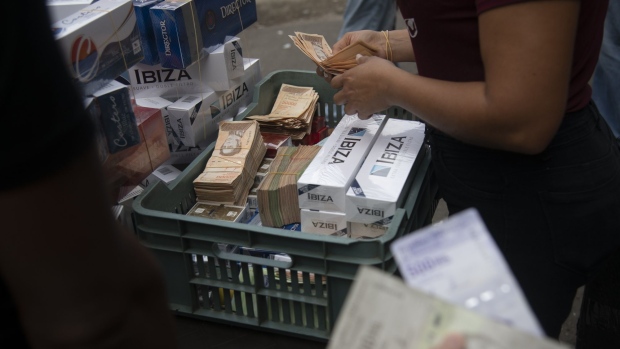May 4, 2021
Cigarette Vendors Are Currency Traders in Disguise in Caracas
, Bloomberg News

(Bloomberg) -- Editor’s Note: There are few places as chaotic or dangerous as Venezuela. “Life in Caracas” is a series of short stories that seeks to capture the surreal quality of living in a land in total disarray.
Ibiza! Costero! Malibu!
The cigarette vendors jog up and down the sidewalks and weave in and out of traffic, yelling out their wares. They sell a lot of brands you've never heard of on El Comercio, which has for years been cheap-tobacco heaven. But these days, not every patron is here for the smokes. The serious side-business on El Comercio is changing money—U.S. dollars for bolivars, the country’s ridiculously hyper-inflated currency.
The cigarettes act as bluffs on the off-chance that police should happen to pass by and take umbrage at an activity that is, on the books at least, illegal. They’re also excellent laundering tools. “Cigarettes are the perfect machine to get bolivars,” said Carlos Gomez, a skinny 27-year-old in wrap-around sunglasses who was arranging his goods for display on a rickety wooden table. (His best customers: other street vendors or shopkeepers who buy cartons in bulk to resell in distant neighborhoods.)
The crazy thing is that bolivars are hot commodities in a country that has for all intents and purposes adopted the legal tender of the U.S. But this dollarization of the economy was carried out in quintessential Nicolas Maduro-style—that is, haphazardly and chaotically—and as a result the bolivar was never truly killed off. It still circulates and curiously is still required to pay for certain things.
The poor are hit the hardest by this glitch. For while people of means simply pay for stuff with dollars via foreign credit cards or debit cards or Zelle or cold-hard cash, the poor need bolivars to take buses and buy subsidized gasoline and shop for staples like flour and beans from merchants who are so desperate for bolivars themselves that they give big discounts for payment in that currency.
And so a robust foreign-exchange market has grown up in Catia, a sprawling slum of low-slung buildings and shacks and dirt. It draws people like Rafael Vargas, 52, a security guard who is often paid in dollars and takes the bus across town to his job in a fancy apartment building in Campo Alegre.
He could do his business at a bank, of course, but that would mean waiting in line for hours. And at many banks, there are daily withdrawal limits. Vargas needs at least 800,000 bolivars a day to cover the bus fare to and from his job.
So he goes to El Comercio, in the middle of Catia, where he’s never happy with the exchange rate. “They end up stealing part of your money, but you can’t do anything to avoid it, because you have to go to work,” he said after changing a crumpled dollar bill. “If we don’t work, we don’t eat.”
Right now, you’ll get about about 2 million bolivars for one buck in Catia. The official government rate, for what that’s worth, is 2.8 million. (For context, 1 million is the largest new bolivar the regime just started printing in its seemingly never-ending quest to create bills in giant-enough denominations; for further context, a bottle of beer in a reasonably priced bar costs around 3 million bolivars.)
The cigarette crews see all kinds, from people like Vargas to gold miners who drive 14 hours from Las Claritas in southern Venezuela and arrive with suitcases full.
“There are miners who bring $10,000 or $15,000,” Gomez said. “With those dollars, we buy cartons of cigarettes.”
The vendors get them for dirt-cheap from wholesalers who import them (actually, smuggle might be the right word) from Colombia or Caribbean islands and sell them at very steep markups for bolivars, which they turn around and sell to the dollar-toting crowds. Tellingly, consumption of the not-famous cigarette brands the exchangers hawk has shot up about 300% since 2019, according to a report from Bigott, a local unit of British American Tobacco Plc.
As for the miners, they're paid in dollars for the gold they illegally excavate and they need bolivars to live. Las Claritas is such a remote outpost that the economy is basically run exclusively on cash. Internet and cell signals are so weak that card transactions usually won't go through. Shops will give 50% discounts for payment in bolivars.
Thus the trek to Catia, or to a few other Caracas neighborhoods, downtown or in Petare, the country's largest slum. There the subterfuge sometimes involves lollipops and coffee. “I buy, I buy, I buy,” the hardly-hidden currency exchangers shout at every corner.
There are other methods for acquiring bolivars, of course. On some buses, drivers will make under-the-wheel exchanges, and people take whatever rate is offered. “It is the easiest way to get bolivars fast,” said Yajaira Meza, a 51-year-old housekeeper. “We don’t have a choice.”
As precious as bolivars are, the most valuable bill in the country is a George Washington. The single is in short supply and so desired that if you can scrounge up eight of them, someone in Catia will give you the equivalent of $10 in bolivars.
Still confused by it all? Don't feel bad. Venezuelans are too.
©2021 Bloomberg L.P.


